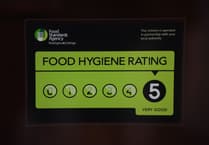Online grooming crimes have more than tripled in Dyfed-Powys since the offence first came into force six years ago, new data compiled by the NSPCC reveals.
Figures provided by all four forces across Wales - Dyfed-Powys, Gwent, North Wales and South Wales - show 554 Sexual Communication with a Child offences were recorded in 2023/24 – more than double the 274 recorded in 2017/18.
In Dyfed-Powys, 19 offences were recorded in 2017/18, rising to 67 in 2023/24.
The 67 online grooming crimes recorded by Dyfed-Powys is the most of any year since the offence came into force, nearly doubling from the 30 recorded the previous year.
The new findings reveal that Snapchat was the most popular platform used by perpetrators to target children online last year, with the messaging app present in almost half (48 per cent) of grooming cases across the UK where the means of communication was disclosed.
Meta platforms were also popular with offenders, featuring in over a quarter of UK recorded cases where a platform was known, with WhatsApp (12 per cent), Facebook and Messenger (10 per cent), and Instagram (six per cent) all being used to abuse children.
NSPCC said that Facebook, WhatsApp, Snapchat, Instagram and TikTok “were all used in cross-platform grooming where the pattern of abuse points to a culture where the first point of contact between children and would-be offenders is on the open web.”
“This can include social media chat apps, video games and messaging apps on consoles, dating sites and chatrooms,” the charity said.
“Children are then encouraged to continue communication on private and encrypted messaging platforms where abuse can proceed undetected.”
Girls are predominantly targeted by offenders for online grooming, making up 81 per cent of total UK recorded cases where gender was known in 2023/24.
The majority targeted were aged between 12 and 15.
The youngest victim of online grooming in 2023/24 was a five-year-old boy.
Thomas [name changed to protect anonymity] spoke to the NSPCC about being groomed online when he was 14.
Thomas said: “Our first conversation was quite simple.
“I was just chatting.
“The only way I can describe it is like having the most supportive person that you could ever meet.
“After about a month, the pressure started to build of him trying to prove that I was gay.
“That’s when he started sending explicit pictures and pressuring me to send images to him.
“I did send him pictures, but I didn’t like it, and I didn’t want to do it anymore.
“He said he had saved the images and would send them to everyone if I stopped sending more pictures.
“There was a constant fear in the back of my mind.
“It wasn’t easy but I managed to block him on all sites and carry on with my life.”
The NSPCC is urging Ofcom to significantly strengthen the rules social media platforms must follow to tackle child sexual abuse on their products.
They say the regulator currently puts too much focus on acting after harm has taken place rather than being proactive to ensure the design features of social media apps are not contributing to abuse.
The NSPCC is also calling on the UK Government to strengthen legislation to ensure child sexual abuse is disrupted in private messages such as on Snapchat and WhatsApp.
Sir Peter Wanless, NSPCC Chief Executive, said: “One year since the Online Safety Act became law and we are still waiting for tech companies to make their platforms safe for children.
“We need ambitious regulation by Ofcom who must significantly strengthen their current approach to make companies address how their products are being exploited by offenders.”





Comments
This article has no comments yet. Be the first to leave a comment.